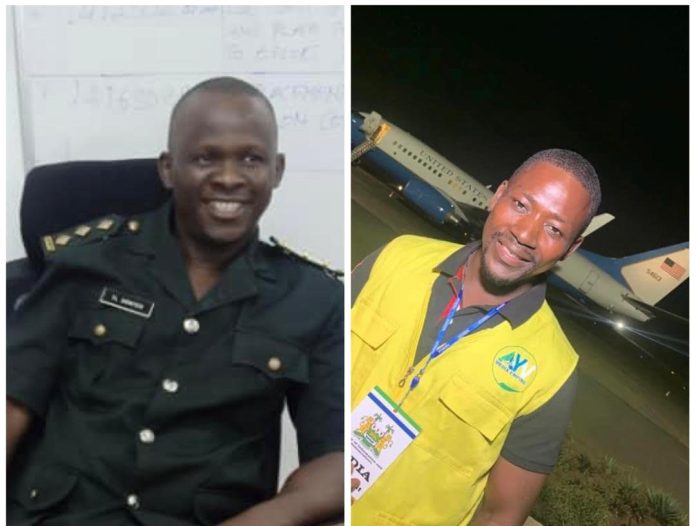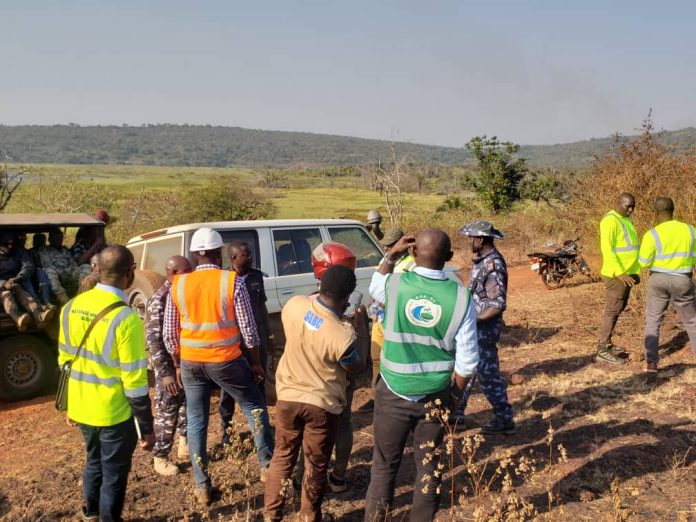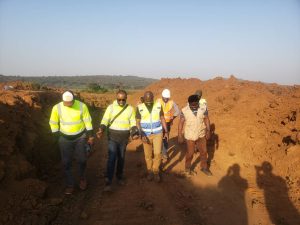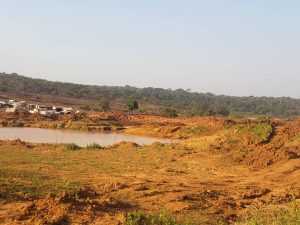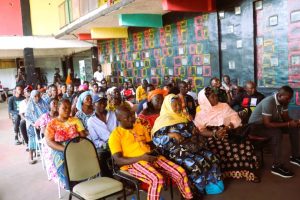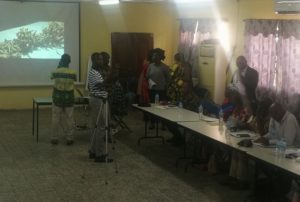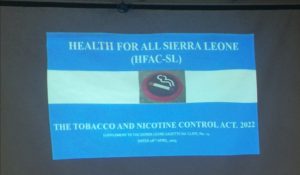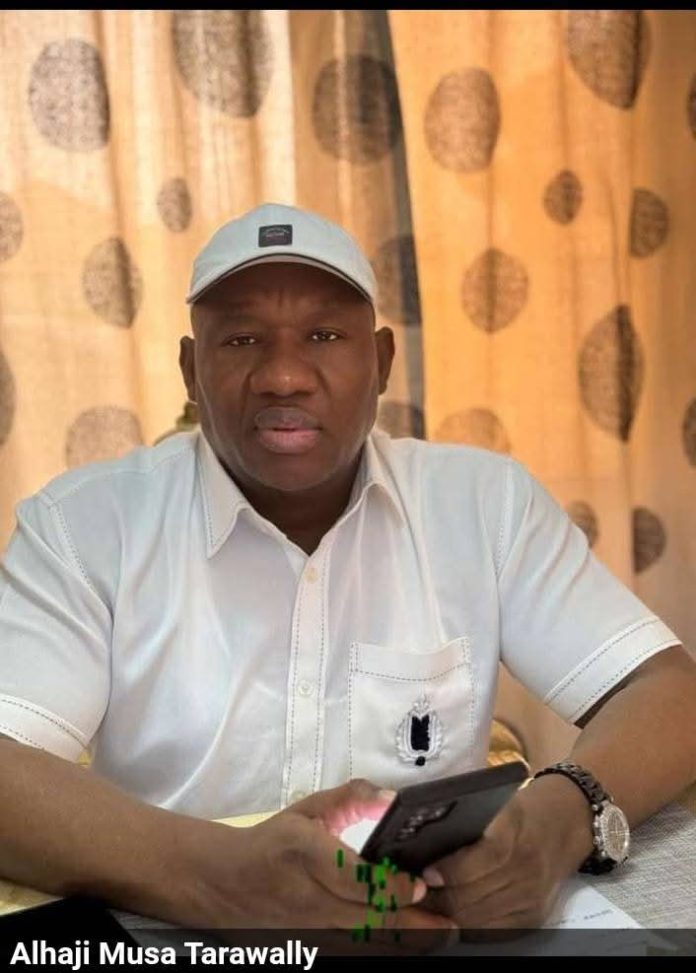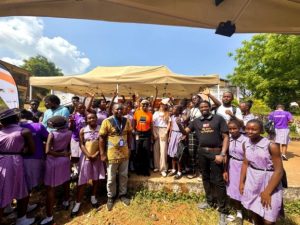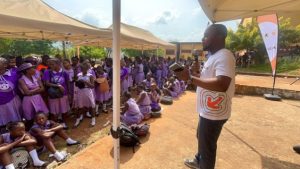By Millicent Senava Mannah
Lokomasama, Kenema and Bo witnessed an extraordinary show of support for Hon. Alhaji Musa Tarawally, one of the leading aspirants for the Sierra Leone People’s Party (SLPP) flag bearer position in 2028. After a nearly four-month tour of Nigeria, Senegal, The Gambia and Europe, Hon. Alhaji Musa Tarawally returned home on Friday, December 13, 2024, to a hero’s welcome.
The fanfare began at the Freetown International Airport, where crowds of well-wishers gathered to greet him. His journey continued to Lokomasama Chiefdom in the Port Loko District, a region of particular significance as his wife, Zainab Tarawally, hails from there. The reception was grand, with traditional leaders, section chiefs and political stakeholders from both the All People’s Congress (APC) and SLPP attending in large numbers to honor the distinguished politician.
Hundreds of well-wishers gathered at the Freetown International Airport to welcome Hon. Alhaji Musa Tarawally. From there, he embarked on a journey that highlighted his influence and growing base of supporters. His first stop was in Lokomasama Chiefdom, Port Loko District, a symbolic location as it is the hometown of his wife, Zainab Tarawally. The grand reception featured traditional leaders, Paramount Chiefs, Section Chiefs and political stakeholders from both the All People’s Congress (APC) and SLPP. This rare display of political unity was seen as a reflection of Hon. Alhaji Musa Tarawally’s message of peace and togetherness.
Traditional authorities, including Paramount Chiefs and community leaders, praised him for his deep-rooted connections to the region and his ability to inspire hope for a brighter future. The Chiefdom Speaker declared their unwavering support, stating, “We the people of Lokomasama appreciate you as our in-law and we will give you all the support you need in your pursuit to lead Sierra Leone.” This open endorsement marked a significant boost for his presidential aspirations.
As a gesture of goodwill, Hon Alhaji Musa Tarawally donated 10,000 New Leones to the youth of Komrabai to support their weekend activities. He assured the gathering of his sincerity in politics, stating, “I am here to help Sierra Leoneans, not for personal gains. I have established businesses in eight countries, and I want to give back to the nation that has given me so much.”
He also cautioned the people not to allow politicians to manipulate or exploit them further encouraging citizens to demand tangible support, specifically, contributions to their cooperatives, before listening to any political promises.
The momentum of Hon. Alhaji Musa Tarawally’s tour continued in Kenema, where massive crowds, comprising SLPP and APC supporters, youth groups and women’s associations, lined the streets to welcome him. The atmosphere was electric, with supporters waving banners and chanting slogans of solidarity. Hon. Alhaji Musa Tarawally’s message centered on “Unity, Wealth Creation, and Security”; core principles of his campaign.
Addressing a large gathering, he emphasized the importance of youth empowerment and national security. “The security of this country is in your hands,” he said, urging young people to avoid violence and embrace peaceful nation-building. His message resonated with the crowd, especially the youth, who are seeking more opportunities for employment and social inclusion.
The final leg of Hon. Alhaji Musa Tarawally’s homecoming tour took place in Bo, where the celebration reached new heights. Colorful banners, traditional drummers and dancers lined the streets as his convoy entered the city. Community leaders, party stakeholders and traditional authorities came out in force to pledge their support for his candidacy. His wife, Zainab Tarawally, played an active role in mobilizing support, describing her husband as a “God-fearing man” committed to uplifting marginalized groups.
During the events, Hon. Alhaji Musa Tarawally announced a groundbreaking initiative aimed at empowering women across the nation. He pledged to invest $1 million in women’s cooperatives in every district of Sierra Leone. The plan, which is part of his broader agenda for human capital development, aims to boost women’s entrepreneurial ventures and financial independence. The announcement was met with widespread applause, especially from women’s leaders like Bintu M.A. Sellu, Chairperson of the Bo District Cooperative Society, who described it as a landmark move for grassroots development.
Hon. Alhaji Musa Tarawally’s generosity is well-documented. His wife Zainab revealed that he had previously provided Le40 million in micro-credit to women’s groups across the country, further cementing his reputation as a champion for women’s empowerment and community development.
A recurring theme of Hon. Alhaji Musa Tarawally’s speeches was his call for unity. In Lokomasama, he urged traditional authorities, community leaders and political groups to prioritize collective progress over personal interests. “Unity is non-negotiable if we want to move Sierra Leone forward,” he declared. His message resonated with supporters from both the SLPP and APC, who hailed his leadership as visionary and inclusive.
Hon. Alhaji Musa Tarawally’s cross-party appeal is seen as a testament to his ability to bridge political divides, a quality that many Sierra Leoneans believe is essential for the country’s progress. His emphasis on youth employment, women’s empowerment and national security aligns with the aspirations of ordinary citizens who are seeking a leader capable of fostering peace, progress, and prosperity.
As his tour concluded, public endorsements from key stakeholders, including paramount chiefs and traditional leaders, solidified Hon. Alhaji Musa Tarawally’s status as a leading contender for the SLPP’s 2028 flagbearer position. The Chiefdom Speaker of Lokomasama hailed him as a “true son of the soil,” while women’s leader Mariatu Kamara praised his consistent support for women’s initiatives.
Political analysts have taken note of the groundswell of support from grassroots communities and influential stakeholders. Many believe that Hon. Alhaji Musa Tarawally’s ability to unite supporters across party lines gives him a competitive edge in the race for the SLPP’s top position. His emphasis on unity, coupled with his well-documented history of philanthropic initiatives, sets him apart as a leader with a clear vision for Sierra Leone’s future.
Hon. Alhaji Musa Tarawally’s triumphant return and successful regional tour have reignited political enthusiasm for his 2028 presidential bid. His vision for a united, secure, and economically empowered Sierra Leone has struck a chord with citizens from all walks of life. With strategic investments in women’s cooperatives, a focus on youth employment and a call for national unity, Hon. Alhaji Musa Tarawally’s campaign is gaining momentum.
As the race for the SLPP’s 2028 flagbearer position heats up, political observers are keeping a close watch on his next moves. His ability to draw support from diverse political groups and regions demonstrates his growing popularity. Many believe that his inclusive approach and commitment to fostering peace, progress, and prosperity could position him as a unifying force in Sierra Leonean politics. For now, all eyes are on Hon. Alhaji Musa Tarawally as he continues his journey to secure the SLPP’s presidential candidacy and ultimately lead Sierra Leone into a new era of unity and development.

